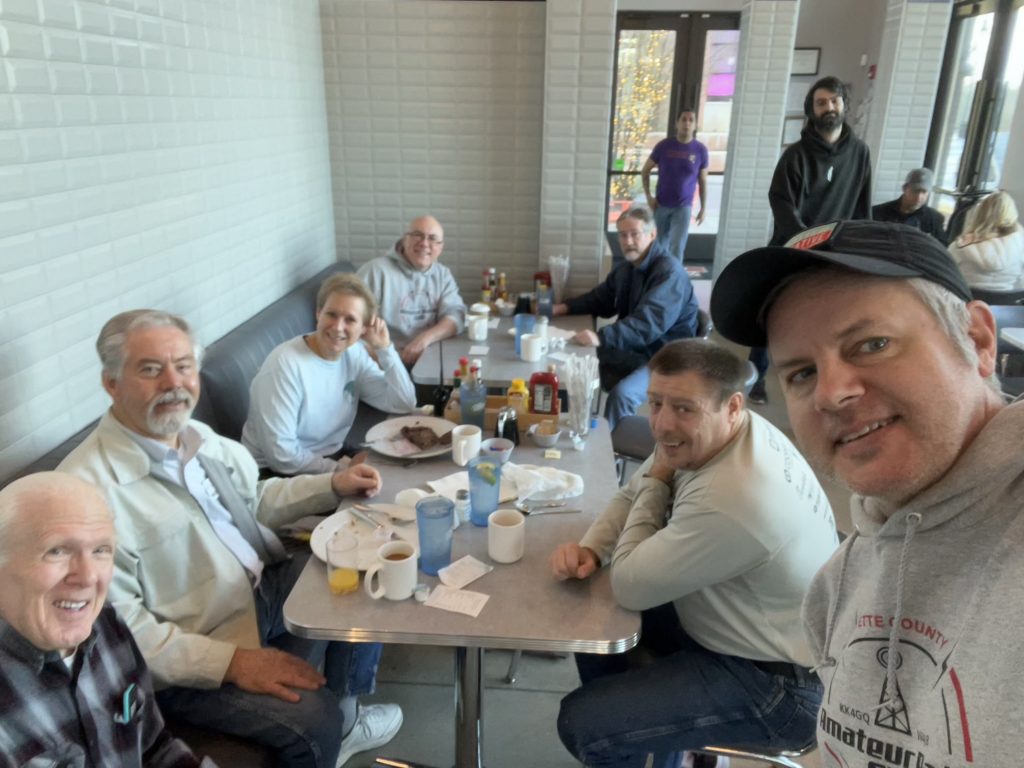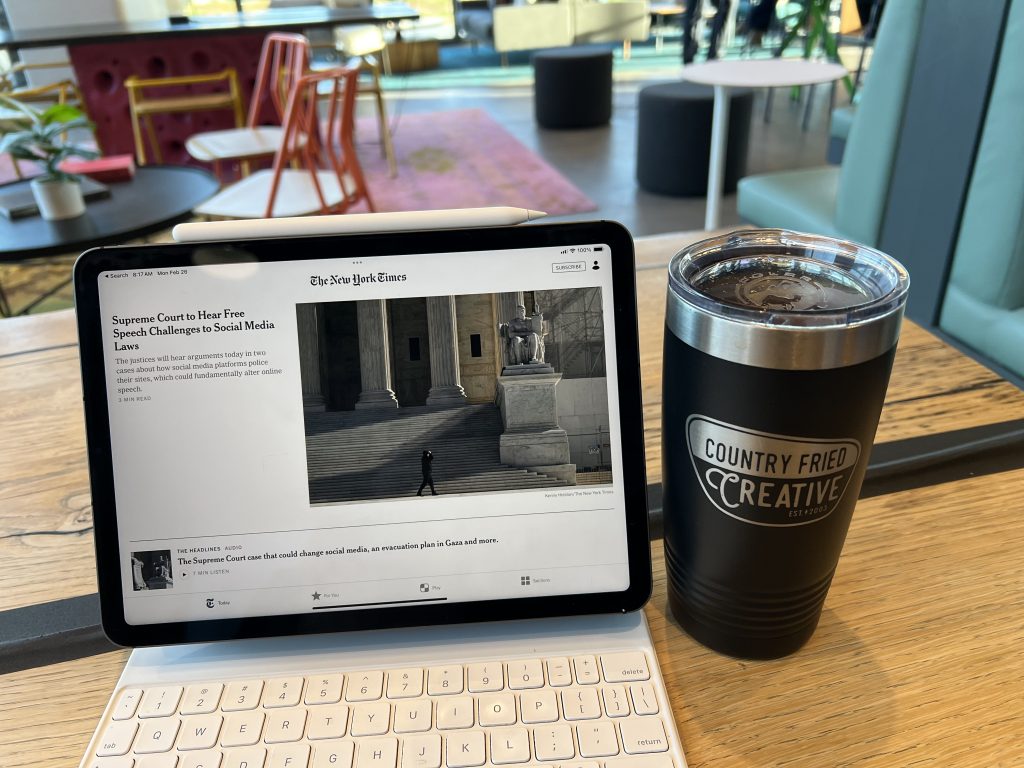Every Friday morning, a group of our friends gets together at 7am to have breakfast and chat at a local restaurant. We talk about a lot of different things, but last Friday (2/23/24), many of us decided to talk about the massive AT&T cellular network failure that occurred the previous day. We noted that it was hard to get news about what was going on. Indeed, AT&T wouldn’t even acknowledge the issue until it was almost resolved six hours later. What little news that was being reported was inaccurate and incomplete. That discussion led to a more general discussion about how and where each of us reads the news. The discussion we had inspired this article.

Some of my friends gathered for breakfast and conversation at Thumbs Up Diner – Trilith/Fayetteville. Photo/Joe Domaleski
Before getting into specific news sources, it’s important to put my recommendations into context by addressing the topic of bias. News reporting always has some kind of inherent bias, even if it’s unintentional (which is rarely the case). Reporters and editors are people who are influenced by their own experiences, perspectives, culture, beliefs, and socioeconomic backgrounds. Besides the people reporting the news, the organizations that publish or broadcast the news also have to cater to their target audience and advertisers.
Be on the lookout for specific types of fake news and bias, including:
- Clickbait – designed to grab attention and get clicks. Most social media news falls in this category.
- Propaganda – created to mislead audiences. This is increasingly becoming a problem with the influence of foreign agents.
- Satire/Parody – unfortunately, I think modern society has a hard time distinguishing between parody and truth. Satire is a dying art.
- Sloppy journalism – in which incomplete stories are published without fact-checking. Be advised that most generative AI models don’t know how to fact-check and many reporters don’t either.
- Misleading headlines – there’s a fine line between a proper headline that brings attention to something and one designed to mislead people.
- Biased/Slanted News – people are often drawn to stories that confirm their own beliefs or biases (called confirmation bias), and fake news can prey on that predisposition.
- Unreliable/False Sources – stories that rely on questionable sources, rumor, or hearsay. ALWAYS check cited sources when reading a news story.
Traditionally, news outlets selected what stories to publish and how to frame them, as is done with this website you’re reading right now. With the advent of AI, algorithms largely determine what we see in most online news outlets. Algorithms are designed to promote popularity. These computer-generated publishing agents assume that if something is popular and fits your profile, then you want to see more of it. Doing so reinforces echo chambers, confirmation bias, and causes a general lack of perspective. That’s not universally true, and just the opposite situation occurred last week. Google’s new Gemini AI ran into problems by doing the opposite and pushed false diversity narratives with a black George Washington and other historical falsehoods.
Recognizing and understanding bias is important. Here’s my own bias when it comes to the news:
I believe it’s important to use discernment and consult a variety of news sources to get a broader perspective, even those sources that don’t line up with my worldview.
Okay, with that out of the way, here’s my recommendations on top news sources for staying informed.
- WSB Radio morning news show – Broadcasting on FM 95.5 / AM 750, this excellent news program has it all – news, weather, traffic, and short interviews. It’s very convenient for Mary Catherine and me to get caught up on the news while we’re drinking coffee and getting ready for the day. Later in the day, WSB Radio has politically opinionated radio shows, but the morning news program is excellent and non-political. Highly recommended investment of five minutes of your time daily.
- BBC World News – with a variety of free digital and broadcast formats, the BBC is a great source of world news. It’s so good that many US-based NPR radio stations license their content and rebroadcast it for a US audience. I don’t always have time to review the world news, but when I do, I start with the BBC.
- USA Today – with its easy-to-read graphics, short articles, and emphasis on news over opinion, this is about as centrist as it gets when it comes to news (unless you consult a newswire like Reuters). When I skim USA Today, I feel like I get a good overview of what’s going on in our nation.
- New York Times – Yes, it’s very well known that the New York Times tends to display a left-leaning, liberal bias. Yet, it’s also well known that the “old gray lady” of news still has some of the best writing, features, and content. They also have cool puzzles like Wordle and the famous New York Times Crossword (any fellow cruciverbalists out there?). I pay for a subscription to this so I can read it on my iPad. Reading the Sunday edition is a tradition I’ve kept for many decades.
- Wall Street Journal (WSJ) – The absolute best source of business news and features is the WSJ. The stock market data isn’t as useful as it once was because there are so many other sources for that, but everything else is relevant and useful. The opinion pieces definitely lean to the right, with well-reasoned conservative viewpoints. The technology column is especially good. If you’re a business leader like me, then the features about leadership and management are also excellent.
- Local government / School system – All of our local municipalities, including the school system, have excellent websites, newsletters, and social media channels. The Sheriff’s Office has an excellent app for your smartphone to alert you to situations, like the shutdown of Hwy 314, which occurred on Saturday. They also echo NWS weather alerts. Sign up for your free, tax-dollar-supported news. With the exception of the Sheriff’s Office, most of the other entities tend to report on events and updates, not necessarily controversial or breaking news. Honestly, that’s not really their job, and they leave that to the next recommended news source.
- TheCitizen.com online – yes, this newspaper website right here is one of your best sources of local news. Totally owned, operated, and funded by people in Fayette County, this is truly an institution not beholden to any particular special interest. The paper makes a clear distinction between news and opinion columns. Because the publisher of this paper believes in free speech, the opinion section can get a little heated at times. Truth is, anyone can write in, and it remains the most popular section. I don’t agree with many of the things published in the opinion section, nor am I required to do so. My own weekly columns are purposely non-political, and I appreciate everyone who takes the time to read them. There’s also the Fayette News, which is owned and operated from Thomaston.
Sometimes breaking news will show up in a questionable location, which inspires me to consult one of the trusted news sources above. I wouldn’t totally rely on the following sources, but they may alert you to something that may warrant further research.
- Twitter / X – probably the best source of breaking or emerging news on the national or international level. When the AT&T network went down last week, this was the first place that reported on it. There’s a lot of misinformation, parody, satire, and bias on Twitter / X – so use with caution.
- Facebook – not my favorite social media platform and definitely not my primary source of news, but often times the source of local, breaking news. Many people in our community hang out in one of the popular county and city Facebook groups. When folks aren’t griping about something, you’ll occasionally hear about something newsworthy pending confirmation from a trusted source. Our local government organizations, school system, and public safety all put out news on their Facebook groups. Besides keeping up with your friends and neighbors, it’s also a decent place to find out about community events.
- Traditional TV / Cable media – Before the rise of Internet news, many of us middle-aged people (and older) watched the news on local TV stations and larger cable networks such as CNN, CNBC, and Fox News. The cable news outlets are well-known for bias, but that’s not the reason I don’t watch them anymore – it’s just not convenient. Being able to pull out my iPhone and skim the news – or – have it read to me using a text-to-audio app just makes it more convenient.
- NPR / GPB News – I really want to like NPR and will listen from time to time. Because they’re trying so hard to be diverse in their programming, it often means that the news they’re reporting on isn’t relevant to me. Market Watch is pretty good for business news. GPB news has excellent state-level news coverage, and I should probably listen to that more often.
- RSS Feeds – I also periodically use an RSS news feed reader called Feedly. It aggregates and pulls news from different online sources via RSS feeds or web scraping. There are other systems out there like Reeder, Apple News, Flipboard, and Readwise who work similarly. Systems like these are very useful, but can be overwhelming. The main advantage is that they can list the headlines in a very useful way so that you can click on them to explore further.
On the subject of news, I’d also encourage everyone to sign up for free NWS weather alerts. Whenever there’s a bad storm, I normally get three alerts at a minimum – a text message, audible siren outside, and my weather radio will signal an alert. Staying informed about the weather could save your life. You can get more information about weather alerts from the NWS Peachtree City / Atlanta website.
It’s more important than ever to stay informed about what’s going on in our local community and beyond. I’d encourage you not to rely solely on algorithms to serve up what they think is important or trendy. Take charge of what you see, read, or hear. Seek out reputable information and news by using a wide variety of sources and formats. For me, that means starting the day with good, old-fashioned radio news. Reading online news and information sites from different sources (and perspectives) helps me gather information to make better decisions. I like to form my own opinions about what’s going on in the world around me. An informed society contributes to a healthier democracy.
What are some of your favorite sources of news and information?
[Joe Domaleski, a Fayette County resident for 25 years, is the owner of Country Fried Creative – an award-winning digital marketing agency located in Peachtree City. His company was the Fayette Chamber’s 2021 Small Business of the Year. Joe is a husband, father of three grown children, and proud Army veteran. He has an MBA from Georgia State University and enjoys sharing his perspectives drawing from thirty years of business leadership experience. Sign up for the Country Fried Creative newsletter to get marketing and business articles directly in your inbox. ]

